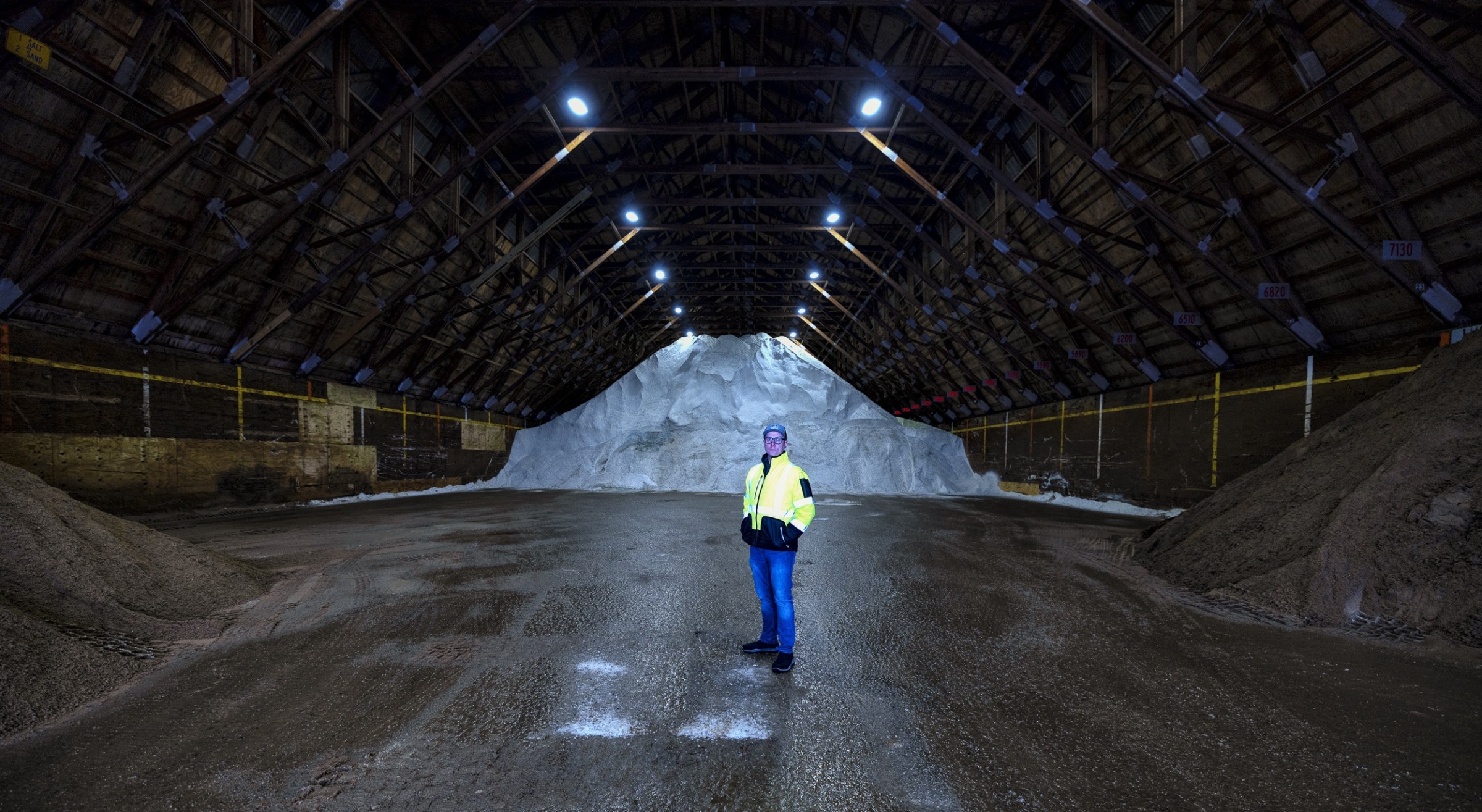The Stream, November 29, 2023: Heroic Llamas Revitalize Farmland in Peru, Where Glacial Melt Acidifies Water and Soil

Jay Saksewski, superintendent of the Grand Traverse County Road Commission, stands in front of a mound of salt in the commission’s storage facility outside of Traverse City. Photo © J. Carl Ganter/Circle of Blue
YOUR GLOBAL RUNDOWN
- Flash flooding continues to debilitate hundreds of thousands of climate refugees in Somalia and Kenya.
- The World Health Organization has warned that infectious diseases, exacerbated by a lack of clean water, could be a “bigger killer” in Gaza than bombardments.
- In the American Midwest and West, where a powerful few control groundwater usage, an economic and political wedge is widening as the resource slowly dwindles.
- As glaciers in the Peruvian Andes continue to melt and retreat due in large part to global warming, an unlikely hero is helping to revitalize farmland: llamas.
Lakes in Ontario, Canada, are being depleted of oxygen due to rising salt levels, prompting calls to reduce the use of road salt.
“We actually use a lot of salt, and salt is a very effective way to keep roads, sidewalks and parking lots free of ice…But I think it’s also very, very important to be aware that there’s a downside to the use of salt.” — Philippe Van Cappellen, a professor and researcher at the University of Waterloo.
Researchers from the University of Waterloo studying local lake chemistry, health, and oxygen levels across the last few decades have found a dramatic increase in salt concentrations, CBC News reports. One of the primary causes: road salt. It is used to de-ice roads in the winter and often washes into groundwater, rivers, and lakes.
The study found that increased salinity coincided with depleted levels of oxygen, which diminishes water health and the potential for plant and animal biodiversity.
Governments in the Waterloo region spend close to $4 million annually on road salt. The researchers suggest that officials become stingier and set targets to reduce road salt use by 25 percent over five years.
In Context: Road Salt, A Stealthy Pollutant, Is Damaging Michigan Waters
— Christian Thorsberg, Interim Stream Editor
Recent WaterNews from Circle of Blue
- Billions in Federal Assistance after New Mexico’s Largest Wildfire. But Little Money to Repair Streams — Stream restoration beset by lack of money and workers.
- US Regulators Order Minnesota to Clean Up Nitrate Contaminated Water — EPA acts to limit an “imminent” health threat.
The Lead
CNN reports that over the past 60 years, climate change has caused Peru to lose 56 percent of its tropical glaciers, from which 20 million people, directly or indirectly, receive water. Over the past four years alone, 164 mountain lagoons have been created by glacial meltwater. More than half of the country’s freshwater reserves have been lost.
This rapid warming, in addition to spurring flooding, has had dire consequences for the country’s high-elevation communities, who depend almost entirely on agriculture to support their livelihoods. Glacial retreat exposes rocky soils and acidic channels, both of which make farming challenging. It can take years for the land to recuperate and support harvests once again.
But recent partnerships between mountain communities and university researchers have utilized a secret, historic helper to “speed up this natural protection in the face of climate change” — llamas.
For thousands of years in Peru, herders have lived with and kept llamas, an important cultural animal in the country. As natural grazers, they are today being returned to these mountain landscapes, helping to scatter seeds and diversify soil composition where glaciers once stood, and acidic waters now trickle.
Researchers have found that plants are growing faster in areas where llamas graze. Their scat is a natural fertilizer for the depleted land, accelerating recovery for communities who desperately need economic uplift and healthy soil.
This Week’s Top Water Stories, Told In Numbers
700,000
Number of people displaced by flash flooding this week in Somalia, as heavy rains have continued late into November, Reuters reports. A combination of El Niño and Indian Ocean Dipole weather patterns have heightened both heat and precipitation in the Horn of Africa. In Somalia, 96 people have been killed by the rains at the time of writing, while 76 people died in neighboring Kenya, where flooding has also led to a shortage of drinking water and shelter for climate refugees.
13
The number of men who serve on the board of Groundwater Management District 3 in Garden City, Kansas, which is responsible for making water pumping decisions on behalf of thousands of constituents, the New York Times reports. Only large landowners, who make up a small percentage of the region, are allowed to vote for the board members, who, since 1996, have “overseen the pumping of 16.2 trillion gallons of groundwater — enough to fill Lake Mead, the country’s largest reservoir, twice over.” This Kansan microcosm, the Times reports, is one part of a larger trend in the thirsty American Midwest and West: a powerful few determining where precious water goes, and how it is used, while countless others have no say in the matter. Those with power are increasingly “fighting efforts to conserve” the resource, making the existential threat of water shortages all the more contested.
On the Radar
The World Health Organization has warned that the ongoing threat of infectious diseases “could be [a] bigger killer in Gaza than bombardments,” France24 reports. At the time of writing, the Israeli government and Hamas had agreed to a temporary ceasefire. Still, humanitarian aid has been slow to arrive in Palestine, where health systems remain devastated from Israeli attacks. Hospitals have few staff and overwhelming needs. Restrictions on fuel supplies are a key driver of this health crisis — desalination plants, water pumps, and water stations cannot operate without power, and hospitals cannot effectively function with a lack of potable water.
In context: Cholera Cases Spike Amid Extreme Weather, Conflict
More Water News
Sweet Potato: New research from the University of Mississippi points to the sweet potato, a tropical crop, as a potentially crucial food for the future. The vegetable can withstand high temperatures and tolerate relatively low amounts of water, Yale Climate Connections reports.
Bauxite Mining: In Brazil, four riverine communities say their lifeways have been upended by a bauxite mine that skirted legally required environmental consultations. As a result, organizers and critics have led Brazilian President Lula to consider a ruling for stronger protections for similar communities in the future, Mongabay reports.
Christian Thorsberg is an environmental writer from Chicago. He is passionate about climate and cultural phenomena that often appear slow or invisible, and he examines these themes in his journalism, poetry, and fiction.






Leave a Reply
Want to join the discussion?Feel free to contribute!